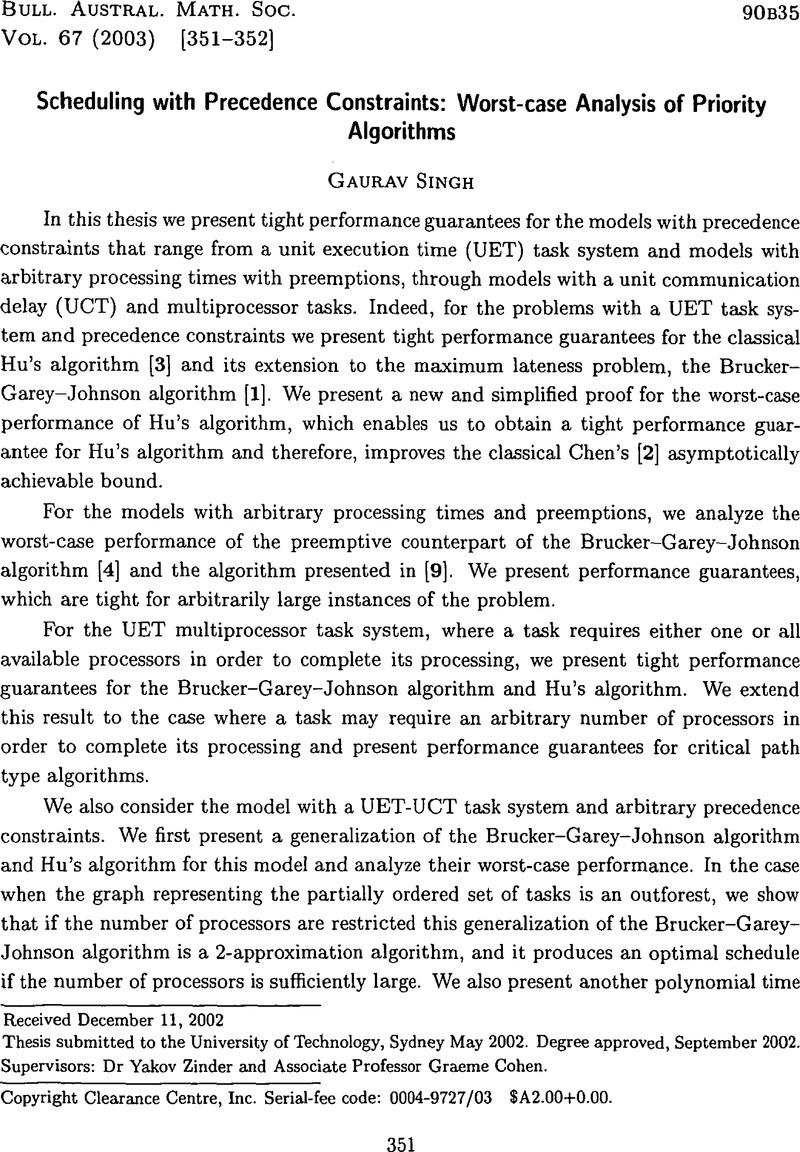No CrossRef data available.
Article contents
Scheduling with precedence constraints: Worst-case analysis of priority algorithms
Published online by Cambridge University Press: 17 April 2009
Abstract
An abstract is not available for this content so a preview has been provided. As you have access to this content, a full PDF is available via the ‘Save PDF’ action button.

- Type
- Abstracts of Australasian PhD Theses
- Information
- Copyright
- Copyright © Australian Mathematical Society 2003
References
[1]Brucker, P., Garey, M.R. and Johnson, D.S., ‘Scheduling equal-length tasks under tree-like precedence constraints to minimise maximum lateness’, Math. Oper. Res. 2 (1977), 275–284.CrossRefGoogle Scholar
[2]Chen, N.F., ‘An analysis of scheduling algorithms in multiprocessing computing systems’, (Technical Report UIUCDCS-R-75–724, Department of Computer Science, University of Illinois at Urbana-Champaign, 1975.Google Scholar
[3]Hu, T.C., ‘Parallel sequencing and assembly line problems’, Oper. Res. 9 (1961), 841–848.CrossRefGoogle Scholar
[4]Lawler, E.L., ‘Preemptive scheduling of precedence-constrained jobs on parallel machines’, in Deterministic and Stochastic Scheduling, (Demster, M.A.H., Lenstra, J.K. and Kan, A.H.G. Rinnooy, Editors), 1998, pp. 101–123.Google Scholar
[5]Singh, G., ‘Performance of critical path type algorithms for scheduling on parallel processors’, Oper. Res. Lett. 29 (2001), 17–30.CrossRefGoogle Scholar
[6]Singh, G., ‘Scheduling UET-UCT tasks on parallel processors to minimise maximum lateness’, (submitted), J. Algorithms (2002).Google Scholar
[7]Singh, G. and Zinder, Y., ‘Worst-case performance of critical path type algorithms’, Int. Trans. Oper. Res. 7 (2000), 383–399.Google Scholar
[8]Singh, G. and Zinder, Y., ‘Worst-case performance of two critical path type algorithms’, Asia-Pacific J. Oper. Res. 17 (2000), 101–121.Google Scholar
[9]Zinder, Y. and Roper, D., ‘An iterative algorithm for scheduling unit-time operations with precedence constraints to minimise the maximum lateness’, Ann. Oper. Res. 81 (1998), 321–340.CrossRefGoogle Scholar
[10]Zinder, Y. and Singh, G., ‘Preemptive scheduling on parallel processors with due-dates’, (Research Report RR02–01, Department of Mathematical Sciences, University of Technology, Sydney, 2002).Google Scholar


